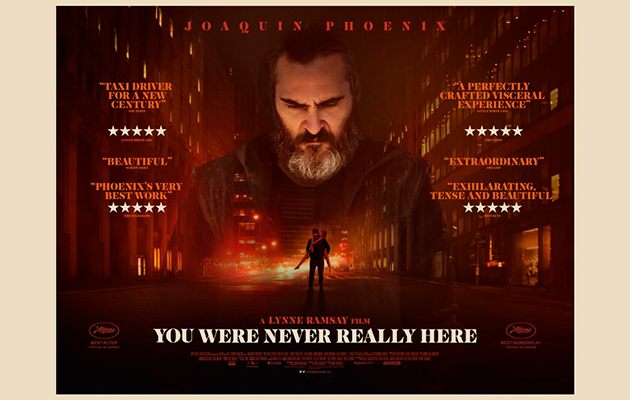A psychologically damaged veteran who drives around New York at night; a young girl in danger from predatory older males; ; a politician up for re-election. You might be forgiven for wondering exactly which film we were talking about here. Certainly, it’s hard not to watch Lynne Ramsay’s latest film without thinking of Martin Scorsese’s Taxi Driver. In Joe – her near-autistic protagonist prone to flights of tormented fantasy – she has created a man who has taken to heart Travis Bickle’s famous maxim and is brutally, relentlessly washing the scum off the streets.
But this being a Ramsay joint, there are other factors at work here. Her lean, electrically-charged film is really about trauma and it’s grim, far-reaching effects. When we first meet Joe (Joaquin Phoenix), he is in a seedy motel room, washing blood from a hammer. There are jump cuts to a child in some kind of distress. None of this bodes well. Joe’s mind is a jumble of memories, flash-forwards and – perhaps – fantasies, from which it is possible to glimpse a childhood marred by abuse and more recent but equally distressing experiences accrued during wartime. In effect, Ramsay offer us a study of a man whose life has been corroded by violence but who now believes that some kind of rescue for himself – and for others – might be possible. A violent, fearsome score from Jonny Greenwood amplifies Joe’s state of mental distress.
When we finally understand what Joe was doing with a hammer in that motel, Ramsay takes the film into unexpected territory. She frames her story as a political conspiracy thriller, no less, with Joe presented as a low-level tough guy in a situation that rapidly escalates beyond his control. Aside from Taxi Driver, you might also be reminded of John Boorman’s Point Blank and Luc Besson’s Leon, or perhaps even the Taken films. But this is an action film in which the action scenes happen off screen; Ramsay is more concerned with Phoenix, running on paranoia as his world unravels.
Follow me on Twitter @MichaelBonner



